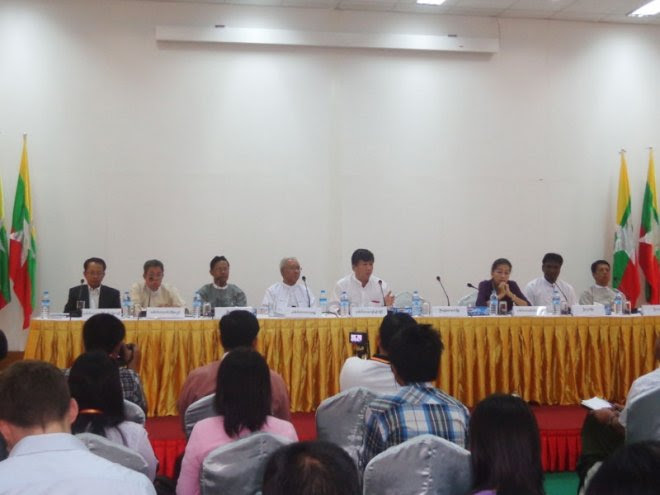A panel appointed by the government to investigate violence in Rakhine State has found there was no evidence to support claims by the United Nations that dozens of Muslims were killed in Du Chee Yar Tan village in January.

The Du Chee Yar Tan Investigation Commission also recommended that eligible members of the Muslim community be granted citizenship under the relevant provisions of the 1982 Citizenship Law.
In its findings released to the public at the Myanmar Peace Centre in Yangon on March 11, the commission also called for steps to build confidence between the Buddhist and Muslim communities in the state, where outbreaks of communal violence since June 2012 have left about 140 people dead and more than 140,000 homeless.
The secretary of the commission, Dr Kyaw Yin Hlaing, said the two communities had no confidence in each other because there was suspicion about whether [Rohingya] were genuine citizens or illegal immigrants.
Article 6 of the 1982 law provides for anyone who was already a citizen when it came into effect to be entitled to citizenship.
The commission was established on the instructions of President U Thein Sein on February 6 to investigate reports of killings in Du Chee Yar Tan, in Maungdaw Township, after a police sergeant went missing during a clash between his patrol and Muslim residents of the village on January 13.
As well as the speedy implementation of the 1982 Citizenship Law and the confidence building measures, the commission recommended that the capacity of the police in Rakhine be upgraded and they be equipped with modern weapons, that the security forces be deployed in numbers appropriate to the population, that roads be upgraded to facilitate a rapid response in emergencies and that news of any incidents be released quickly.
Commissioners were quoted as saying that granting citizenship to eligible [Rohingya] would allow members of the group to administer their own villages, instead of being under the control of ethnic Rakhine village officials.
U Hla Thien, a Muslim elder in Maungdaw Township and a member of the commission, told Mizzima he welcomed the recommendation to implement the citizenship law.
The commission’s finding that there was no evidence of any killings in Du Chee Yar Tan after the police sergeant went missing contradicts claims by the UN High Commission for Human Rights, NaviPillay, that 48 Rohingya were killed in the village.
The commission, which submitted its report to President U Thein Sein on February 28, said it interviewed 175 people in Maungdaw Township between February 15 and 20 as part of its investigation.
The 10-member commission comprised Rakhine Buddhist and Muslim community leaders, and members of human rights and ethnic reconciliation groups.



